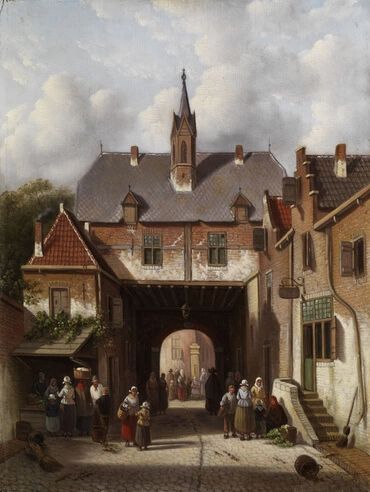Arcana Coelestia # 3126
3126. Verses 28-30 And the girl ran and told [those of] her mother's house all about these things. And Rebekah had a brother, and his name was Laban; and Laban ran to the man outside, to the spring. And so it was - when he saw the nose-jewel and the bracelets on his sister's hands, and when he heard the words of Rebekah his sister, who said, Thus the man spoke to me - that he went to the man, and behold, he was standing with the camels at the spring.
'The girl ran' means the inclination of that affection. 'And told [those of] her mother's house all about these things' means towards whatever natural good enlightenment was able to reach. 'And Rebekah had a brother' means the affection for good in the natural man. 'His name was Laban' means the essential nature of that affection. 'And Laban ran to the man outside, to the spring' means its inclination towards truth that was to be introduced into Divine truth. 'And so it was, when he saw the nose-jewel and the bracelets on his sister's hands' means when it recognized Divine Good and Divine Truth within the power of the affection for truth, meant by 'a sister'. 'And when he heard the words of Rebekah his sister' means the inclination of it. 'Who said, Thus the man spoke to me' means the leanings of truth in the natural man. 'And he went to the man' means that it attached itself. 'And behold, he was standing with the camels' means presence in general facts. 'At the spring' means the enlightenment of them from Divine truth.
Gate

Gates" in ancient times had a significance that does not hold in the modern world. Cities then were enclosed by walls for protection; gates in the walls let people in and out to do their business, but were also the weak points in the cities' defenses. In the Bible, cities on one level represent the minds of individual people. On a broader level, they represent beliefs shared by a community. The gates, then, represent openings where the Lord can feed us an understanding of truth and a desire for good. They also represent points where the hells can invade and sway us with false ideas and evil desires. We are kept in balance during our lifetimes, with influences from both the Lord and from hell. Ideally, we will over our lifetimes continue to invite the Lord farther and farther in and drive the hells back until ultimately the Lord can occupy our minds completely. And that point our belief in Him and His power and love will hold the gates and deny evil any entrance. As individuals, we at that point become angels. As communities, we at that point become part of the Lord's church. And at that point the gates become an entry point, introductory truths that allow people to enter churches and start bringing the Lord into their lives.






